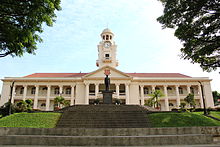Education for primary, secondary, and tertiary levels is mostly supported by the state. All institutions, private and public, must be registered with the Ministry of Education.[230] English is the language of instruction in all public schools,[231] and all subjects are taught and examined in English except for the "mother tongue" language paper.[232] While the term "mother tongue" in general refers to the first language internationally, in Singapore's education system, it is used to refer to the second language, as English is the first language.[233][234]Students who have been abroad for a while, or who struggle with their "Mother Tongue" language, are allowed to take a simpler syllabus or drop the subject.[235][236]
Education takes place in three stages: primary, secondary, and pre-university education. Only the primary level is compulsory. Students begin with six years of primary school, which is made up of a four-year foundation course and a two-year orientation stage. The curriculum is focused on the development of English, the mother tongue, mathematics, and science.[237][238] Secondary school lasts from four to five years, and is divided between Special, Express, Normal (Academic), and Normal (Technical) streams in each school, depending on a student's ability level.[239] The basic coursework breakdown is the same as in the primary level, although classes are much more specialised.[240] Pre-university education takes place over two to three years at senior schools, mostly called Junior Colleges.[241]
National examinations are standardised across all schools, with a test taken after each stage. After the first six years of education, students take the Primary School Leaving Examination (PSLE),[237] which determines their placement at secondary school. At the end of the secondary stage, GCE "O"-Level exams are taken; at the end of the following pre-university stage, the GCE "A"-Level exams are taken. Of all non-student Singaporeans aged 15 and above, 18% have no education qualifications at all while 45% have the PSLE as their highest qualification; 15% have the GCE 'O' Level as their highest qualification and 14% have a degree.[242] Singaporean students consistently rank highly in international student rankings, especially in science and mathematics.[243][244][245][246]
Some schools have a degree of freedom in their curriculum and are known as autonomous schools. These exist from the secondary education level and up.[239] Singapore has 6 public universities[247] of which the National University of Singapore and Nanyang Technological University are among the top 20 universities in the world.[248]

No comments:
Post a Comment